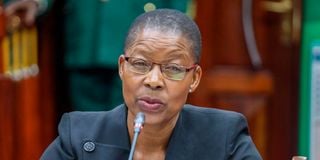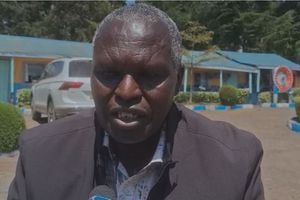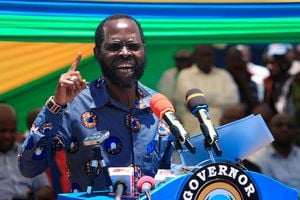AG fights application on auctioning government property

The Attorney General Dorcas Oduor during her vetting by the Parliament Committee on Appointments on August 9, 2024.
What you need to know:
- The AG says that the application by the lawyer for empanelment of the bench is defective as there is no substantive petition that underpins the request for appointment of the judges.
- “The existence of novelty in itself does not entitle the empaneling of a bench, even one judge can hear such matters,” said the AG.
Attorney General (AG) Dorcas Oduor has opposed an application by a lawyer seeking to have Chief Justice Martha Koome appoint a bench of not less than seven judges to determine a petition related to the attachment of government property or bank accounts to fulfill monetary decrees.
The AG says that the petition by lawyer Gikandi Ngibuini falls short of the threshold for naming a bench of seven judges to hear it.
“The petition does not raise any novel issues, it merely wants to litigate a matter already litigated and is undergoing various litigation,” argues the AG in her grounds of opposition.
According to the AG, there is no complex issue, and the petition is not convoluted with facts and voluminous pleadings.
“It does not require the empaneling of seven judges, the court should take into consideration that judicial resources are scarce and the petition does not qualify to have all those judges tied to hear it while there are other matters that require their attention,” argues the AG.
The AG says that the application by the lawyer for empanelment of the bench is defective as there is no substantive petition that underpins the request for appointment of the judges.
“The existence of novelty in itself does not entitle the empaneling of a bench, even one judge can hear such matters,” said the AG.
The Council of Governors, which is also an interested party in the case also opposed the petition, saying issues raised in it have been adjudicated up to the Court of Appeal.
Mr Gikandi is challenging a law that exempts litigants, who have won cases against the government, from attaching its (government) properties or bank accounts to fulfill monetary decrees in their favour.
He is challenging the validity of Section 21 (4) and (5) of the Government Proceedings Act and Order 29 Rule 2 and 4 of the Civil Procedure Rules which bars the execution of judgments against the government to recover monetary decrees made by courts.
Mr Ngibuini argues that the issues raised in the petition are of general public importance since it speaks to the violation of fundamental freedoms and rights enshrined in the constitution.
“Considering the great anxiety existing regarding the laws and the fact that the petition raises substantial questions of law, it is important that it (petition) be heard and determined by a bench of seven judges at the earliest possible opportunity,” argues Mr Ngibuini.
Mr Ngibuni, whose firm is seeking to be paid Sh23.9 million by the county government of Tana River after it successfully sued it, argues that courts have delivered inconsistent decisions regarding the execution of judgments against the government.
“The existing landscape of judicial pronouncements reveals a landscape marred by inconsistency, leading to uncertainty and inequity for litigants seeking to enforce their rights against the government,” argues Mr Ngibuini.
Mr Ngibuini argues that the time is now ripe for the court to make a definitive and binding determination on the constitutionality of Section 21 (4) and (5) of the Government Proceedings Act and Order 29 Rule 2 and 4 of the Civil Procedure Rules.
He wants the court to declare that his constitutional rights provided for under the constitution have been violated under Section 21 (4) and (5) of the Government Proceedings Act and Order 29 Rule 2 and 4 of the Civil Procedure Rules which bar him from treating the government as any other ordinary party against whom execution decree can be issued.
Mr Ngibuini says that the Attorney General, Kenya Law Reform Commission, and the Law Society of Kenya are mandated by law to take all necessary actions to appropriately ensure that the law is reformed to align it with the constitution.





